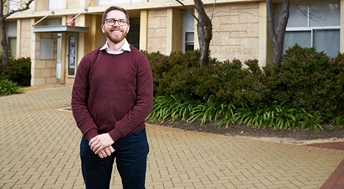Undergraduate
Bachelor of Criminology and Criminal Justice
Majors available
Criminology and Criminal Justice (Extended Major)

The extended major in Criminology and Criminal Justice is a specialised program that will provide you with an understanding of contemporary issues in Criminology and Criminal Justice by equipping you with knowledge and perspectives from disciplines including criminology, law, psychology, history, anthropology, geography, and forensic science.
The learning experience
UWA facilities include lecture theatres, case study rooms and break-out areas for group work and individual study.
UWA Schools
Six libraries
One of Australia’s most picturesque campuses
Five residential colleges
Vibrant student experience
Vibrant student experience
Adjacent to the Swan River, our Perth campus is among the most picturesque in Australia with iconic sandstone buildings sitting among heritage-listed gardens. We’re just 10 minutes from Perth’s main shopping and business district and close to many of the city’s stunning beaches.
On campus, you’ll have an array of essential amenities to enjoy, including cafés, libraries, bookshops, a vibrant cultural precinct and tonnes of clubs and societies to join and experience student life to its fullest. Our supportive Student Guild means you can try your hand at volunteering, get independent advice on a range of matters or attend one of the many varied events on and off campus.
Fees and scholarships
Domestic Student Fees
For Commonwealth-supported places, student contribution amounts are charged by unit, based on area of study. For a fee estimate, go to the Fee Calculator and select “I want to price my units”. Fees are subject to annual indexation. Refer to the Handbook to identify the units required. More information on how fees are calculated.
Scholarships
Scholarships are available to students from a diverse range of backgrounds, including academic achievement, financial need, educational disadvantage, leadership and community service, artistic or sporting achievements, and being from a rural or remote area.
Career opportunities*
- Criminologist
- Community development worker
- Police/correctional services officer (sworn or unsworn member)
- Policy advisor at the local, State, or Commonwealth level
- Health/justice researcher
- Youth worker
- Working in loss-prevention and risk management in the private sector
*Postgraduate study may be required
International Student Fees
Onshore international students are charged an annual course fee, charged per credit point at a rate dependent on the course in which the student is enrolled. Annual course fees are calculated based on an annual study load. Check the handbook to confirm the annual study load for your course.
Find out more about international student tuition fees and visit the fee calculator for the relevant course fees.
Fees are subject to annual indexation.
Scholarships
Scholarships are available to students from a diverse range of backgrounds, including academic achievement, financial need, educational disadvantage, leadership and community service, artistic or sporting achievements, and being from a rural or remote area.
Careers and further study
Career opportunities
Our Bachelor of Criminology and Criminal Justice and single Criminology major in the Bachelor of Arts or Philosophy (Honours) have been designed to maximise your employability by focussing on the specific, practical skills that employers in industry are looking for.
You'll be encouraged to question current practices and find ways for improvement while developing a broad range of policy and practice-relevant skills, including the capacity to think critically, integrate theory and research into practice, and communicate effectively in written and oral forms, which will maximise your employability in the criminal justice and government sector.
Career opportunities include*:
- Criminologist
- Community development worker
- Police / correctional services officer (sworn or unsworn member)
- Policy adviser at the local, State, or Commonwealth level
- Health / justice researcher
- Criminal / social justice advocate
- Youth worker
- Working in loss-prevention and risk management in the private sector
*Postgraduate study may be required
Further Study
Further study will allow you to gain a Doctor of Philosophy (PhD). It will open up opportunities in academia and research to help you pursue your goals in a wide range of careers, depending on your area of research.
You may also be interested in:
Entry requirements
Admission requirements
To be considered for this course you need to:
- achieve the University’s minimum entry score
- demonstrate English language competence
- satisfy any prerequisites for your preferred majors (refer to individual major descriptions for prerequisite details)
You can view the prerequisites and recommended subjects for your chosen course here.
View our admission requirements for specific information, depending on your education history.
Assured Pathway information
If you have a professional career in mind, take advantage of one of our Assured Pathways. An Assured Pathway gives you an assured place in one of our postgraduate professional courses (such as Law, Engineering or Medicine) from the start of your studies with us. The pathways combine a range of undergraduate and postgraduate courses, providing you with a clearer direction to your career of choice.Admission entry to UWA
We offer a number of other pathways for you to gain entry into our undergraduate degrees if you do not meet the standard admission requirements. Learn more about our admission entry pathways.
About the Bachelor of Criminology and Criminal Justice
Learn about the role Criminology plays in understanding crime and how we deal with it, as well as effective criminal justice interventions.
Our specialised bachelor's degree in Criminology and Criminal Justice will teach you to draw upon knowledge and perspectives from disciplines including criminology, law, psychology, history, anthropology, geography, and forensic science. Through this, you’ll be exposed to the breadth of contemporary criminology and criminal justice issues.
Core criminology content will require you to learn about contemporary explanations for crime and criminality, the current structure of the criminal justice system, transnational and international crime, best-practice approaches to working with offenders, national and international factors impacting on criminal justice policy making and approaches to prevent contemporary crime and justice problems in Australia.
Quick details
- 70
- February and July
- 3 years full-time
- 111633K
- UP050
What's the difference between our Bachelor of Criminology and Criminology major?
Our Bachelor of Criminology and Criminal Justice differs from the single Criminology major in Arts or Philosophy (Honours) for the following reasons:
- You'll learn about the importance of forensic science for justice.
- You'll demonstrate competence in the core research methodologies of the discipline (such as quantitative methods, statistical analysis, and qualitative approaches to research).
- You can choose to develop your mapping skills through taking an option unit. Mapping skills form an increasingly important part of crime analysis.
- You'll have the opportunity to take a work-integrated learning placement (for credit) in your final year.
Professor Joe Clare

Professor Joe Clare is a Criminologist at the UWA Law School, and is also an award-winning lecturer and researcher. He has worked in applied research roles for universities and governments in Australia and Canada, utilising his quantitative research expertise to contribute to policy and practice decisions in a range of criminal justice contexts. His research interests include applied evaluations, crime statistics, policing, crime prevention, and academic misconduct.
"I’m committed to evidence-based decision-making for emergency first responders and focused on using administrative data to make prevention-focused policy and practice decisions."
Why study Criminology and Criminal Justice at UWA?
- Gain a solid understanding of contemporary issues in Criminology and Criminal Justice through this interdisciplinary degree.
- You’ll learn from world-leading academics with strong expertise and who are active researchers in the field.
- You’ll benefit from the Law Schools strong industry connections.
- This Bachelor’s degree is an ideal pathway into the Juris Doctor.
You'll learn to
- advise governments on issues relating to national / international / transnational criminality, crime prevention, policing, sentencing, corrective services, offender treatment, and offender risk assessment / management
- question current practices and find ways for improvement, while developing a broad range of employment-relevant skills, including the capacity to think critically, integrate theory and research into practice, and communicate effectively
- effectively locate, analyse, and critique contemporary criminal justice resources
- develop independent, evidence-based positions on contemporary criminal justice resources
- build a strong argument and formulate policy related advice
Professor Hilde Tubex

Professor Hilde Tubex is the Director of Criminology at UWA. Her areas of expertise are comparative criminology, Indigenous peoples and the criminal justice system and criminalised women. Prior to joining UWA in 2011, Hilde worked at the Department of Corrective Services in WA as the Team Leader of Research and Evaluation. Before migrating to Australia, Hilde was an adviser to the Belgian Minister of Justice and the Council of Europe.
"Being a Criminologist is still the job of my dreams. It is challenging because there are no simple solutions to complex problems in crime and punishment, but trying to explain and do something about it is what gets me out of my bed in the morning”.
Western Australia's premier Law School
The UWA Law School is ranked in the top 150 law schools in the world for Law and Legal Studies (QS 2025). You will join and contribute to 90 years of excellence: we are the first law school established in WA and the fifth oldest in Australia.
Our graduates include a Prime Minister, a Governor of Western Australia, State Ministers, Justices of the Supreme Court of WA, a Young Australian of the Year, Rhodes Scholars, and more.
While we have a long and proud history, we're also a closely-knit, creative and progressive Law School, fostering critical thought, ethical scholarship and practice, a deep connection to our Indigenous past and present, and supportive student culture based upon wellbeing and inclusion.
Dr Hayley Passmore

Dr Hayley Passmore is a lecturer in Criminology at the UWA Law School and has qualifications in child health, criminology and psychology. Hayley is dedicated to supporting the health of those in adult corrections and youth justice facilities, particularly those who are neurodivergent. Hayley has received international recognition for her research and its impact, including receiving a 2020 Churchill Fellowship, and was a 2022 WA Finalist for Young Australian of the Year.
“I’m passionate about using evidence to improve the health and wellbeing of people who are involved in the justice system – because prison health is public health.”
Associate Professor Jade Lindley

Associate Professor Jade Lindley is a Criminologist at the UWA Law School whose research focuses on transnational crimes and their intersection with international law. Jade is particularly interested in transnational organised crime, with a focus on the criminal motivations to offend and the responses to control these crimes. Jade has worked in state and federal level government in Australia and as a consultant for various international organisations around the world.
“My research intersects with pertinent global issues relating to human, border, environmental and food security, several of which are within the scope of the UN’s Sustainable Development Goals.”



